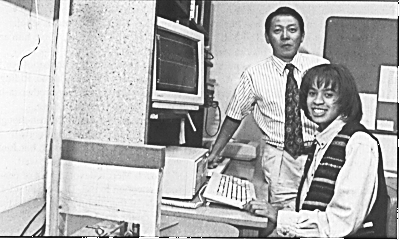Introduction
| The Center for
Information Systems Engineering and Management (ISEM) at Tennessee
State University (TSU) contributes to the research base of the
state in three areas: astro-
physics/robotics, advanced control systems and system
identification, and management
information systems. Since 1986 the center has grown to four
full-time researchers, three
faculty associates, a systems analyst and a director. Over 60
students, both graduate and
undergraduate, have significantly participated in center research
projects. These students
have come from the computer science, mathematics and engineering
curricula. |
Honors
|
| The ISEM Center has
distinguished itself in several ways. For example, the National
Science Foundation awarded funds to build the first minority
university research grade
telescope to TSU in 1991. This telescope is located on Mt. Hopkins
in Arizona and is
remotely operated from the TSU campus.
Because of its success in obtaining high quality astrophysical
data, the center has been
named principal astronomer on five robotic telescopes
(Vanderbilt/TSU 16-inch,
Smithsonian Astrophysical Observatory 30-inch, Fairborn Observatory
10-inch, TSU
32-inch and a 20-inch Automatic Imaging Telescope) and currently
controls more ro-
botic telescopes than anyone else in the world. In the past, center
astronomers have been
privileged to use the Kitt Peak facilities and the International
Ultraviolet Explorer satel-
lite. Center astronomers were also awarded time on the Hubble Space
Telescope. In 1995,
the center competed for and was awarded a $6.5 million grant from
NASA to establish
the Center for Automated Space Science. The focal point will be the
construction and
operation of a 2-meter, automatic, spectroscopic
telescope. |
Major Programs
|
| Astrophysics/Robotics Research - The Astrophysics/Robotics
group investigates a wide range of magnetic phenomena in
convective stars -- those with surfaces cooler than the Sun's. This
research aims to
understand which properties of these stars cause magnetism and how
magnetism changes
the star's outer atmosphere, rates of mass loss in stellar winds
and luminosities. A second
goal of the group is to pioneer automation in astronomy through the
use of computer-
controlled "robotic" telescopes and the use of the latest
communications technology to
reduce the cost of measuring properties of stars. |
|  |
OUTSTANDING STUDENT -
Monica Page,
a student research assistant in the center, shown here with her
advisor, Dr. Jiann-Shiun Lew, was named undergraduate Researcher of
the Year (1994) by the National Science Foundation at their
Conference on Diversity in the Scientific and Technological
Workforce. |
| Advanced Control
Systems and Systems Identification -
Since the early 1980s, robust control has been at the forefront of
advanced control system
research. One of the three major approaches to this type of
problem, the parametric
approach, is the focus of our Advanced Control Systems group. This
method is unique
and has a promising future for application to real world systems.
The software developed
by the center research staff has been installed at NASA field
installations and is currently
being tested to identify potential applications to their satellite
control problems. This
group has published two books, Control of Uncertain Dynamic Systems
and Robust
Control: Parametric Approach, which have become popular as
essential graduate level
course resources in many schools.
Management Information Systems - Although still a fledgling
effort, this research effort has already produced seven refereed
publications in the area of group support systems and was cosponsor
of the Eleventh
Annual Office Research Conference in San Antonio, Texas. This
group, which has received
much assistance from the TSU College of Business, is expected to
flourish as our
other areas have. |
Major Accomplishments
|
|
- The center has generated millions in externally funded
research.
- Center-operated robotic telescopes have discovered over 100 new
variable stars.
- A center-operated robotic telescope observed the largest
stellar flare ever seen.
- The center has developed robotic telescopes capable of making
the most precise measurements of stellar brightness. It has also
developed robotic telescopes that can make observations at a tenth
of the cost of traditional, manual methods.
- The center has produced 251 publications, 182 in refereed
journals. Additionally, center personnel have made 184
presentations at regional, national and international conferences
and symposia. Four internationally recognized researchers have
visited the center to
collaborate and publish with center staff. Center staff serve as
referees for a variety of prestigious journals and for important
scientific organizations.
|
Conclusion
|
| Over the past nine
years, the ISEM Center has evolved to a level of maturity such that
it
significantly contributes to humanity's body of knowledge. The work
and success of this
center is the very essence and spirit of the original intent of the
state's Centers of Excellence
program. TSU anticipates that the center will continue along its
path toward excel-
lence by enhancing the research environment, producing scholarly
work and providing a
genuine research experience for graduate and undergraduate
students.
|


|
|

